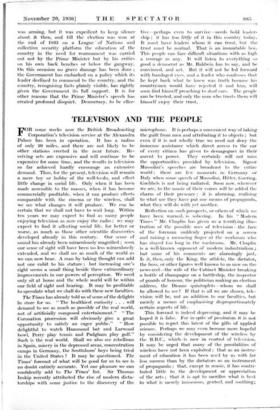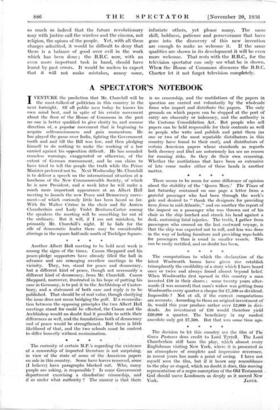TELEVISION AND THE PEOPLE
FOR some weeks now the British Broadcasting Corporation's television service at the Alexandra Palace has been in operation. It has a radius of only 20 miles, and there are not likely to be other stations erected in the near future. Re- ceiving sets are expensive and will continue to be expensive for some time, and the results in television so far achieved hardly encourage an extensive demand. Thus, for the present, television will remain a mere toy or hobby of the well-to-do, and effect little change in social life. Only when it has been made accessible to the masses, when it has become. commercially profitable, when it can produce effects comparable with the cinema or the wireless, shall we see what changes it will produce. We can be certain that we shall not have to wait long. Within ten years we may expect to find as many people enjoying television as now enjoy the radio ; we may expect to find it affecting social life, for better or worse, as much as those other scientific discoveries developed already in this century. Our sense of. sound has already been miraculously magnified ; soon, our sense of sight will have been no less miraculously extended, and we shall see as much of the world as we can now hear. A man by taking thought can add not one cubit to his stature ; but increasing one's sight seems a small thing beside these extraordinary improvements in our powers of perception. We need only sit at home and the whole world will be within our field of sight and hearing. It may be profitable to speculate what we shall do with these new faculties.
The Times has already told us of some of the delights in store for us. " The healthiest curiosity . . . will demand to see as much as possible of the real world, not of artificially composed entertainment." " The Coronation procession will obviously give a great opportunity to satisfy an eager public." " How delightful to watch Hammond bat and Larwood bowl, Perry play tennis and Padgham play golf." Such is .the real world. Shall we also see rebellions in Spain, misery in the depressed areas, concentration camps in Germany, the Scottsboro' boys being tried in the United States ? It may be. questioned. The Times' forecast of what will be good for us to see is no doubt entirely accurate.. Yet one pleasure we can confidently add to The Times' list. Sir Thomas Inskip recently attributed the rise of modern dicta- torships with some justice to the discovery of the microphone. It is perhaps a convenient way of taking the guilt from men and attributing it to objects ; but even if it is not wholly true we need not deny the immense assistance which direct access to the ear of every citizen has given to demagogues in their ascent to power. They certainly will not miss the opportunities provided by television. Signor Mussolini's speeches arc broadcast to the entire world ; there are few moments in Germany or Italy when some speech of Mussolini, Hitler, Goering, Goebbels is not being radiated. Soon now, wherever we are, to the music of their voices will be added the charm of their presence ; it is alarming, realising to what use they have put one means of propaganda, what they will do with yet another.
Reflection on such prospects, or others of which we have been warned, is sobering. In his " Modern Times " Mr. Chaplin has given us a terrifying illus- tration of the possible uses of television—the face of the foreman suddenly projected on a screen: and raising a menacing finger at the workman who has stayed too long in the washroom. Mr. Chaplin is a well-known opponent of modern industrialism ;. but some . of his comments arc alarmingly just.- Is it, then, only the King, the athlete, the dictator, the boss, or other figures well known to us now on the news-reel—the wife of the Cabinet Minister breaking a bottle of champagne on a battleship, the inspector of guards of honour, the politician making an election address, the Dionne quintuplets—whom we shall: be allowed to see ? If that is all we are shown, tele- vision will be, not an addition to our faculties, but merely a means of emphasising disproportionately. certain aspects of life.
This forecast is indeed depressing, and it may be hoped it is false. For in spite of pessimism it is not possible to regret this latest of the gifts of applied science. Perhaps we may even become more hopeful by considering the development of the wireless by the B.B.C.; which. is new in control of television. It may be urged that many of the possibilities of wireless have. not been exploited ; that as an instru•. ment of. education it has been tael by us with far less success than by the dictators as an instrument of propaganda ; that, except in music, it has contri- buted little to the development or appreciation of the arts ; that it is apt to sacrifice what is best - to what is merely innocuous, genteel, and, soothing; so much so indeed that the future revolutionary may with justice call the wireless and the cinema, not religion, the opium of the people. Yet, with all these charges admitted, it would be difficult to deny that there is a balance of good over evil in the work which has been done ; the B.B.C. now, with an even more important task in hand, should have learnt by past errors. It would be useless to expect that it will not make mistakes, annoy some,
infuriate others, yet please many. The mere skill, boldness, patience and perseverance that have gone into the discovery of this new invention are enough to make us welcome it. If the same qualities are shown in its development it will be even more welcome. That rests with the B.B.C., for the television spectator can only see what he is shown. Whea the House of Commons discusses- the B.B.C. Charter let it not forget television completely.





























































 Previous page
Previous page